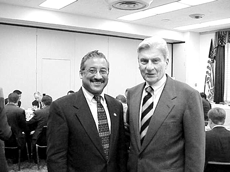VOLUME 3, ISSUE 342 | October 14 -20, 2004
POLITICS
House Kills Hate Crime Measure
Tom DeLay’s negotiator outmaneuvers Senate effort to approve sexual orientation language
For the second time in four years House negotiators have removed language from a Defense Department funding bill that would have added the categories of sexual orientation, gender and disability to the federal hate crimes laws.
The Local Law Enforcement Enhancement Act (LLEEA) would have allowed federal aid to be given to local law enforcement agencies in investigating and prosecuting violent crimes motivated by a victim’s actual or perceived sexual orientation, gender or disability, as well as authorize federal prosecution of those crimes. The measure would also have streamlined current law to facilitate the federal prosecution of all hate crimes.
Right now, federal hate crime laws only cover a victim’s race, nationality, color or religion.
In June, the Senate passed the LLEA, also known on Capitol Hill as the Federal Hate Crime bill, by a 65 to 33 margin as an amendment to the 2005 Defense Authorization Bill.
The House passed the same funding measure without the hate crime language. Discrepancies between House and Senate bills must be worked out in conference before going on to the White House for the president’s signature.
Last week, before the conference committee met, the House voted overwhelmingly in favor of a non-binding resolution instructing its leaders to preserve the hate crime language in the Senate’s version of the Defense authorization bill. The resolution calls on members of the House-Senate conference committee to keep the Senate’s version when reconciling differences between the two bills.
Republican House leadership under the majority leader, Tom DeLay, a Texas Republican, has refused to allow the hate crimes bill to come for a direct vote in the House. Rep. Jerrold Nadler, a Manhattan Democrat, said that the House representative for the conference committee, Tom Feeney, a Florida Republican, testified on September 14 before a closed session of the Armed Services Committee that he wanted LLEEA removed from the final bill because he considers it to punish thoughts rather than action, and treat similar crimes unequally.
Feeney’s office did not return a telephone call seeking comment.
The main sponsor of LLEEA, Sen. Ted Kennedy, a Massachusetts Democrat, along with the Oregon Republican, Gordon Smith, said in a statement, “Clearly, Pres. Bush is worried about his right-wing base in the coming election, and the implication is obvious that the White House sent word to its Republican allies in the House—block the hate crimes provision, even if blocking it denies the clear will of the majority.”
Kennedy vowed, “We will be back again and again, and we will continue to bring this legislation up every opportunity we can until it is signed into law.”
The chairman of the conference committee, Sen. John Warner, a Virginia Republican who voted in favor of the LLEEA, told the Washington Post on September 17 that he hoped the language would be preserved in the final bill, but would not let important defense funding stall on what he called an unrelated issue.
In 2000, the Senate also included the same hate crime bill as an amendment to the Defense Authorization Bill. As happened this time, the House then also voted in favor of a non-binding resolution to preserve the Senate version, but House negotiators in the conference committee removed the hate crime language.

































